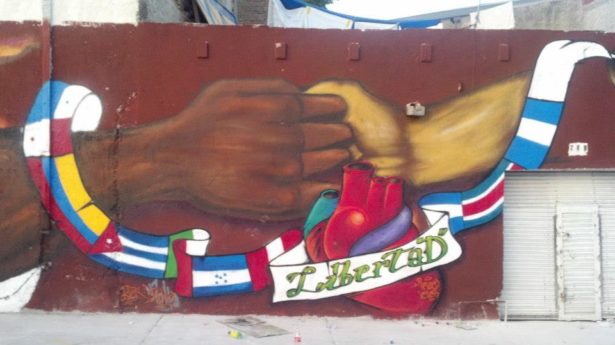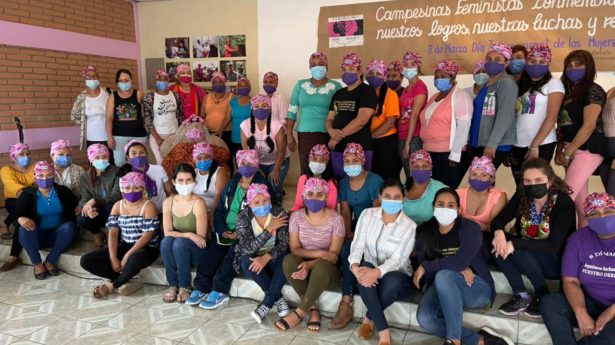The Unitarian Universalist Service Committee advances human rights through grassroots collaborations.
“The Light of Hope”: A Reflection from UUSC Partner FM4 Paso Libre 1 Year After the COVID-19 Lockdown (Part 2)

By Lindsey Hoemann on April 15, 2021
This is the second and final installment of the series. Part one is here.
UUSC partner FM4 Paso Libre, based in Western Mexico, recently shared reflections with UUSC about how the shelter has been faring during the COVID-19 pandemic. This interview was an opportunity to reflect on lockdown during the last year, how their services have changed, and how the shelter continues to move forward with its work given the demands on its resources.
UUSC: 3) Did the local and national authorities that you have contact with provide any kind of support before the pandemic? How would you describe the response of the authorities throughout this crisis? What types of regulations, restrictions, or other rules have been put in place by authorities in response to the pandemic? How have these restrictions affected the population served by FM4 and their daily activities?
FM4 Paso Libre: Generally speaking, there was little support from the Mexican authorities in the face of the pandemic. At the federal level it was null. At the state level, in the beginning the Jalisco Health Secretariat (SSJ, in Spanish) was able to perform some tests to detect COVID-19. However, as the pandemic progressed, contact with the SSJ tapered off as their services were overwhelmed by demand. The authorities that helped us the most during the emergency were the municipalities of Zapopan and Guadalajara. The first provided 170 packages of food to be distributed to the families of migrants and refugees that we serve. Guadalajara took steps to improve the neighborhood where our shelter is located; the social environment was improved by cleaning roads, pruning trees, and adding lighting to urban areas.
4) How would you describe the quality of public health services (physical, psychological) in these months and the possibilities of accessing these services?
In the case of being insufficient or inaccessible, how have they been able to respond to the health needs of residents and collaborators?
In general terms, the quality of public health services worsened as a result of the COVID-19 pandemic, since all public institutions turned their focus (and continue to focus) on managing the pandemic. Several of the public hospitals underwent a reconversion, which meant that their second and third level care for medical specialties was paused, unless it was urgent or life-threatening.
5) What are the changes or adaptations that FM4 has made in its activities and processes in response to this situation? Have they made more permanent changes or adaptations to the physical space of the house? Do you think these changes will be, in some way, permanent?
We made improvements to the spaces where we work. Thanks to UUSC’s donation in particular, we were able to put a shade roof on top of our interior patio space. This has helped us continue to serve people in mobility while maintaining ventilation and healthy physical distance. We will continue with these changes at least until the federal government’s “traffic light” system for pandemic risk turns green.
6) From what you know of other shelters, houses, and organizations that support people in mobility, are they in similar situations?
For organizations that support migrants, do you think this will significantly change their ways of operating? Or do you see that at some point in the future you can go back to what could be called “normal”?
We see similarities in the management of the COVID-19 pandemic with other humanitarian aid spaces within the Guadalajara Metropolitan Area. They had to modify their spaces and reduce their capacity by half in order to avoid crowding.
7) Now that we are approaching a year of pandemic, lockdown, and crisis, how are the residents, volunteers, and collaborators in the shelter? How are they feeling? How have they been able (or not) to adapt over the last year?
At this point, our volunteers have decreased by almost 60 percent, which is understandable since most volunteers prefer to shelter at home. In terms of the mood of volunteers and collaborators, some of them have expressed stress and uncertainty due to the situation we’re going through; some have suffered the loss of family members or loved ones, which, coupled with the necessity of social distancing, increases the loneliness that some feel.
8) What are the challenges that you see for this year that is beginning? What are your hopes?
For us, keeping the space for humanitarian aid open is a fundamental challenge. Another is diversifying our financial resources, since some projects with intergovernmental organizations (IGOs) were reduced, which compromised our operating capacity—FM4 Paso Libre as an organization depends heavily on the resources that these IGOs contribute.
Even in these situations of humanitarian crisis happening globally, and particularly in Mexico, we find hope in knowing that there are organizations and people with whom we can build bridges in favor of people in migration.
9) Do you have any thoughts on this “year of crisis”, and what has it meant for you at FM4 and for people on the move in general? The residents of the house, have they offered or shared other reflections from their context or that of their families?
One of the lessons this year of crisis has taught us is the importance of rethinking our model of care, and thereby continuing to provide humanitarian aid—with all the difficulties that this represents. The second reflection has to do with the importance of a humanitarian aid space during the emergency. For many people in migration who were stranded in the midst of the crisis, finding a space for humanitarian aid meant an oasis among the uncertainty. In addition, some other migrants and refugees who were living in the Guadalajara Metro Area and were fired from their jobs, found the shelter to be a listening space, where they were accompanied in attending to their needs.
10) Any other comments you would like to add?
We want to say that it is important to keep the light of hope in the midst of so much uncertainty.
***
About UUSC: Guided by the belief that all people have inherent worth and dignity, UUSC advances human rights globally by partnering with affected communities who are confronting injustice, mobilizing to challenge oppressive systems, and inspiring and sustaining spiritually grounded activism for justice. We invite you to join us in this journey toward realizing a better future!
Photo Credit: Luis Enrique González / FM4 Paso Libre

